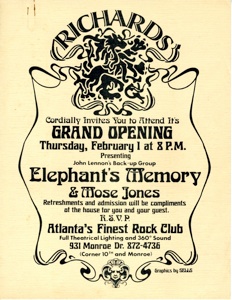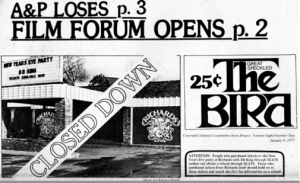 Richards opened with a bang on Atlanta’s scene. It was a sophisticated night club venue to have a rather intimate experience with a musical favorite. Unfortunately it also closed with flare.
Richards opened with a bang on Atlanta’s scene. It was a sophisticated night club venue to have a rather intimate experience with a musical favorite. Unfortunately it also closed with flare.
The Great Speckled Bird Jan. 9, 1975 Vol. #2 pg. 1
Another music club has bitten the dust. Ted Nugent and the Amboy Dukes were scheduled to play at Richards December 26-28. But when they arrived in town, no one from the club could be found. Even employees who arrived for work December 26 were surprised to find… the power cut off. Several days later the ticket window was boarded up and a sign warning about Bad Dogs inside appeared across the door. After two years’ existence and amid months of rumors, Richards has finally been closed down—forced out of business.
Rich Floyd, one of the principal partners of the operation explained to the Bird the sequence of events leading to the closing of Richards. During Christmas week the club was closed on Monday, Tuesday, and Wednesday (December 23-25) to give the employees a long vacation. It was also reasoned that few people would attend any shows on those days anyway. That week the bank decided to collect payment on a note and tried to get in touch with someone at the club to inform them of the move. Since no one was at the club to answer the phone, the bank went ahead and pulled the payment for the note out of Richards’ operating fund. As fate would have it, Georgia Power Company also decided to collect during this same week. No one answered the phones at the club, so fearing the worst (“Ye gods, they’ve absconded with all that rock ‘n’ roll money!”) the Power Company. yes indeed, cut the power. As co-day manager Diane Fraikin put it, when she arrived for work as usual on Thursday, December 26 to find the power shut off, “It knocked the socks right off me.”
At the time, the two principal owners were out of town for the holidays: Richard Bryan was in North Carolina and Rich Floyd was in New Jersey. When they were finally contacted, the drama of the whole incident finally unfolded: The power’s cut off? OK, pay the bill. What do you mean there’s no money? The bank did what?
So, by Friday, December 28, it was evident that Richards was indeed closed. Rich Floyd said it would take a lot of money to reopen the club. If someone had the money, wanted to operate the club under Richards name and even have Rich Floyd do the booking, Floyd said he would not be adverse to such an arrangement. But no one has really come up with the investment needed. “People don’t realize how much overhead is involved,” Floyd said. If the public thought Richards was making tremendous amounts of money, it was not considering the high fees that went to performers and the emphasis placed on obtaining and maintaining quality sound equipment. Unfortunately, some of the sound system was stolen when someone broke into the club when it was first evident that it had closed.
Richards was one of those few remaining places in town that would give local musicians a chance to play…for money. Although only the well established and better known local-based groups (few were from Atlanta; most came from other parts of the Southeast) were booked, still, it was another place for Atlantans to hear music by musicians living in Atlanta. Over the years the clubs that have supported local musicians exclusively or to a large degree have all died. In the early folkie days there were places like the Eighth Note, the Catacombs, the Bottom of the Barrel (became One-Eyed Jacks), the Bistro (still open and popular with its devoted clientele). The People’s Place in Little Five Points was community-oriented and lasted about a year; today the Common Cup in the Metanoia Building pursues a similar line of entertainment.
Funochio’s called itself “Atlanta’s Original House of Rock.” It provided live rock and roll in a club atmosphere. Although the bands were not big names, they were fairly decent bands from all over the Southeast (and Atlanta locals) who provided better music than found in the suburban rock clubs and singles apartment complex clubhouses. This didn’t exactly compare with the New York or Los Angeles rock scenes, but it was better than nothing, which had been Atlanta’s fate for so long.
Rich Floyd and Richard Bryan were in competition with Alex Cooley for the building at 10th and Monroe that had formerly been: Jenning’s Rose Room, Chuck’s Rathskeller, Bachelors III, and the never-opened Steve Major’s American Scene. The two Richards were able to acquire a liquor license, thus retaining a claim for the building from the owner (Roger Jennings). Previous clubs had had reputations for Mafia connections, going out of business through difficulty in obtaining or retaining liquor licenses.
The new club called Richards billed itself as “Atlanta’s Finest Rock Club.” The claim was not made idly, for the people involved put out tremendous efforts to make this come true. Mike Bone, former publicist for Richards (now doing PR for the GRC label) cited three reasons that contributed to .the club’s good reputation in the music business. Foremost were the conscientious people who worked there, like Johnny Terrell who would come in at 6 or 7 in the morning and work eight hours or more to get the club clean for that night’s shows. Diane Fraikin and Sims Hines were co-day managers, working beyond mere requirements of getting the job done. Terry Maxwell and Harold Dotson handled the sound system… Steve Demetrius was bar manager…there were the stage and light crews too. Not least of all were the waitresses “who took a lot of shit.” These people. came in six nights a week, putting up with all the crowds of people, noise and smoke, sitting through the same acts as part of their job to bring the best production for the audience.
Another aspect of Richards that Bone mentioned ‘ was an attitude to “take care of business in a Southern fashion.” Rich and Richard “tried to do things right” and made efforts to take care of the supporting act and the headliner, to “turn them on to the South,” like having dinner at Mrs. Hull’s. From a record company’s point of view, Richards had a good set-up for press parties. The blue room with the pool tables and Little Richards restaurant off of it were places to get away from the crowd and the band and do some-work with radio, newspaper, retail people, or what not.
The third element about Richards was that everyone seemed to notice right off when it opened . (February 1, 1973)—the quality of entertainment being offered to Atlanta in a club setting for the first time. Bone said that the first summer (’73) Richards made a lot of money for it was doing a lot of business. It seems that people just went wild having big name entertainment in a rock and roll club setting. Sometimes 400-500 people would be there on a slow week night like Tuesday. Even on the weekends a big act wasn’t needed to bring in capacity crowds (800). One of the highlights for Bone was the Soft Machine appearance, an “artsy” move for a club in Atlanta, and the first time they appeared in the city since the shared bill with Jimi Hendrix in 1968 at the Municipal Auditorium. King Crimson, Robin Trower, Ike Continued from cover and Tina Turner Revue, Tower of Power were the performances Bone remembers as much more enjoyable at close range than in a concert hall. The Marshall Tucker Band played at Richards during its first week of operation and before much attention was being given the band outside its hometown of Spartenburg, SC. One of Richards movements into the avant garde, so to speak,-was booking Iggy and the Stooges when there was no other place suitable, or that would have the nerve, as Bone put it, to do so.
But aside from rock ‘n’ roll, Richards brought to Atlanta some of the old blues greats: Muddy Waters, Howlin’ Wolf, Willie Dixon, and the Giant Blues Show featuring Roosevelt Sykes, Big Walter Horton, and Robert “Jr.” Lockwood. These blues performances weren’t big money makers for Richards, but the old blues men, long exploited by the white controlled music business were paid “quite well.” Many of the shows were broadcast over the college radio stations (WRAS and WREK); some were taped and used on radio stations as far away as California, but usually around the Southeast. After Funochio’s, Richards was a “step in the right direction” because of the quality of entertainment, the big names. When Alex Cooley’s Electric Ballroom opened March, 1974, this was a step even further.
Back in the Spring of 1973 , when the now defunct Twelfth Gate was undergoing its second big remodeling and grand reopening, the two managers of the small club each made significant statements in a Bird interview. Robin Feld noted that with the opening of other live music clubs that served beer and wine (the Gate did not at the time) and the lowering of the drinking age to 18, much of the Gate’s young audiences began going elsewhere. Funochio’s and Richards were two of the places that were drawing the people from the Gate. But it was not so much that these places were in competition; people didn’t take seriously the notion that you must attend all these places and support them in order for them to survive. The question then is, should Atlanta be a one club town? In a seemingly contradictory statement, co-manager Ursula Alexander (now with the Great Southeast Music Hall) said at the time that similar businesses to the Gate in Atlanta were helping it out so that it would work “Because the more places there are in the city like this, the more creative the whole environment can be.” The key, of course, was cooperative efforts.
The Twelfth Gate closed its doors for good the second week of January, 1974. Funochio’s House of Rock had died somewhere in there. Richards was almost one year old then, now Richards has also closed its doors. As his first venture in night club management, Rich Floyd does not consider Richards a failure, “The way it had to close was unfortunate, but! got a lot of satisfaction from it.” The club had been suffering a bit from the economic situation and what Floyd contended to be another factor—competition for the audience with other clubs. Richards was not his only source of income and he’ll continue to produce Howard Stein’s concerts in Atlanta. It might be interesting to start a jazz club, but Floyd thinks there would be the same problem of not enough people supporting the endeavor. Something that continues to haunt him and others associated with the club was how little recognition was given to Richards by Atlanta (especially the Journal and Constitution) for its contributions to the music scene here, like “breaking” many artists into popularity in Atlanta. Yet, national trade magazines (Billboard, Cashbox, etc., even Rolling Stone) continually mentioned Richards as being responsible for making certain artists popular with Atlanta audiences.
The closing of Richards only goes to show that if Atlanta wants to consider itself a viable contender for a music center, it has got to wake up to what is right’ under its nose.
—j.d.cade
